On May 22nd, the Third Annual Conference of Government and Economics and the Launch Ceremony for the Journal of Government and Economics were successfully held in Beijing. The events were jointly organized by the Tsinghua University School of Social Sciences, the Tsinghua University Academic Center for Chinese Economic Practice and Thinking (ACCEPT), and the Society for the Analysis of Government and Economics (SAGE).
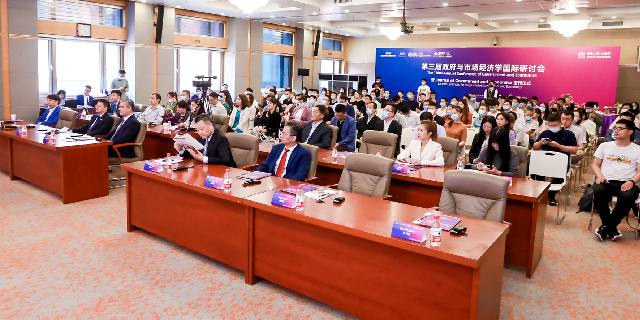
Opening speeches were delivered by Peng Gang, Vice President of Tsinghua University, David Daokui Li, Director of ACCEPT and Co-President of SAGE, and Eric S. Maskin, 2007 Nobel Laureate in Economics, Adams University Professor at Harvard, and Co-President of SAGE. Other esteemed keynote speakers included Ge Honglin, President of the China Nonferrous Metals Industry Association and former Mayor of Chengdu; Gao Peiyong, Vice President of the Chinese Academy of Social Sciences; Wu Xiaoqiu, Vice Chairman of the Academic Committee of Renmin University of China and Dean of the China Capital Market Research Institute; Marcos Troyjo, President of the New Development Bank and former Minister of the Economy of Brazil; and Nicholas Stern, IG Patel Professor of Economics and Government at the London School of Economics and Political Science, Fellow of the British Academy, and Co-Chair of the Global Commission on the Economy and Climate.
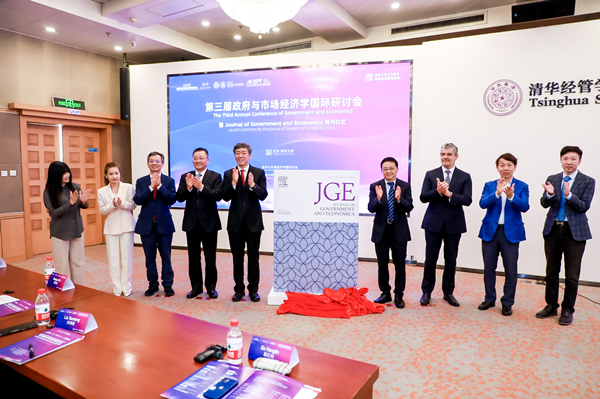
The conference also featured the launch of the Journal of Government and Economics (JGE), a new international academic journal in economics. Louise Curtis, Senior Vice President of Life and Social Sciences Publishing at Elsevier, spoke highly of JGE’s publication as the first professional international journal in the field of government and economics. The new journal was inaugurated by Liu Taoxiong, Secretary of the Party Committee of the School of Social Sciences of Tsinghua University, Li Ke’aobo, Executive Deputy Director of ACCEPT, Huang Zhangkai, Managing Editor of JGE and Professor of the Tsinghua School of Economics and Management, and representatives of Elsevier Publishing.
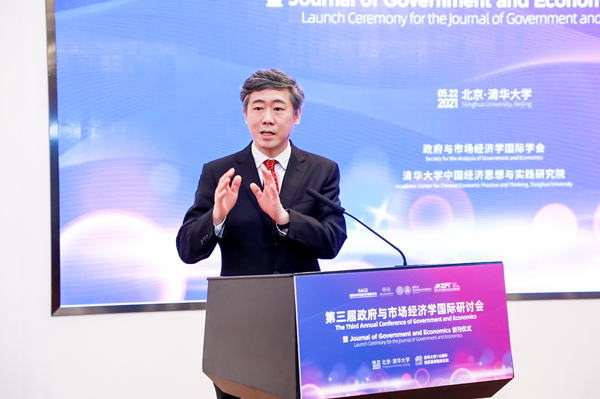
In his speech, David Daokui Li introduced the emerging field of government and economics, explaining that it is the project of a group of economic scholars from Tsinghua University and around the world who have worked to carefully construct this new branch of study over the past few years. He then demonstrated the need for this new field by showing that governments have become extremely active and important players in the modern market economy. The driving purpose of the study of government economics is to determine what role the government should play and which government mechanisms are most suitable to help the market economy unleash its maximum potential. Professor Li pointed out that scholars in China and abroad agree that one of the basic lessons conveyed by China's economic development over the past 70 years is that the relationship between the government and the market, as well as internal government affairs, must be managed well. Furthermore, this reality has been overlooked by contemporary economics research. He expressed his hope that the new field of government and economics will broaden the vision of economics research both domestically and internationally, helping the world to better understand China, and in doing so, encouraging greater acceptance of the practices that China has found effective for managing its market economy.
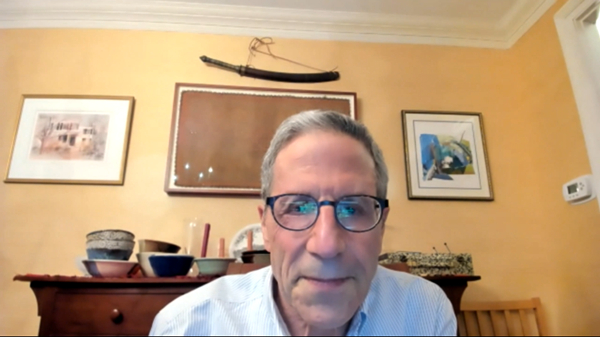
SAGE Co-President Eric S. Maskin began by affirming the importance of government and economics as an independent field of study: that is, the government plays a critical role within advanced market economies, influencing the performance and prosperity of markets. He argued that compared to Adam Smith's time, government participation in GDP has increased from 5-20% to 60%, with significant changes in the role and status of economic activity. Regarding the launch of the Journal of Government and Economics (JGE), Maskin pointed out that this new journal will help fill a significant gap in current economic research, which has failed to adequately address the government’s role, incentives, and behavior within a market economy under the existing frameworks of public economics, public choice theory, industrial organization theory, and political economy. Moving forward, JGE will be able to provide the relationship between government and economy with the attention and in-depth research that it deserves.
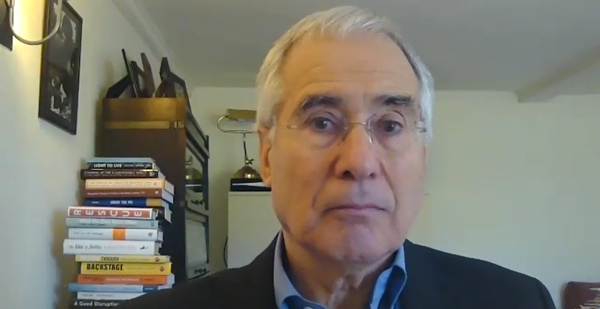
On the current hot topic of carbon neutrality, Nicholas Stern pointed out four major challenges. First, the combination of physical capital, human capital, natural capital, and social capital has changed people's understanding of the traditional growth model. Second, the world is pressed for time to achieve net-zero emissions in the next 30 to 40 years. Third, in the face of new technologies that keep emerging and developing, it is difficult to give accurate predictions and judgments regarding carbon targets. Fourth, the new development model will bring about a mismatch between production and consumption, and the process of achieving net-zero emissions will be hindered if the related benefits cannot be guaranteed. Although the role of the market is enormous, Stern argued that to achieve carbon neutrality goals, it is not feasible to rely solely on the market. Beyond recognizing the market forces at play, economists must understand the flaws of the market. Indeed, in a state of dysfunction and deficiency, even a market in a fully competitive state cannot guarantee its efficiency. Government effectiveness largely determines the protection of innovative R&D, the risk of capital markets, the implementation of public policies, and the functioning of cities, land, energy, transportation, and networks.
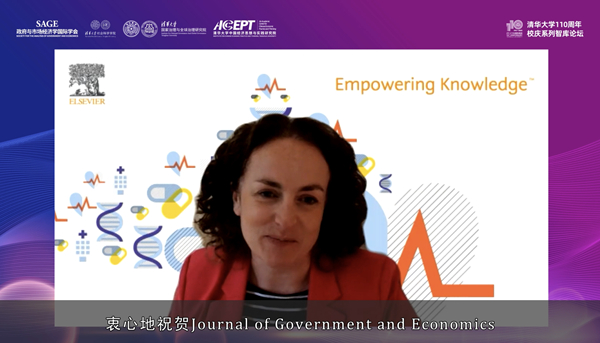
According to Louise Curtis, the Journal of Government and Economics (JGE) is the first professional international journal in the field of government and economics. Having worked in publishing for 22 years, she knows that it takes a tremendous amount of effort to get a new journal off the ground. On the importance of the discipline of government and economics, she said it is a relatively new field of study that addresses the role of government as a participant in the market economy. The growth in the research on related topics can be seen in the publishing data over the last five years, during which research on the role of government in economic activity has grown significantly, demonstrating a 30% increase in research output in the field overall. Curtis believes that journals play a key role in promoting the visibility of research, guiding the direction of study, supporting research findings to generate new real-world applications and impact, and helping new disciplines to take root and grow.
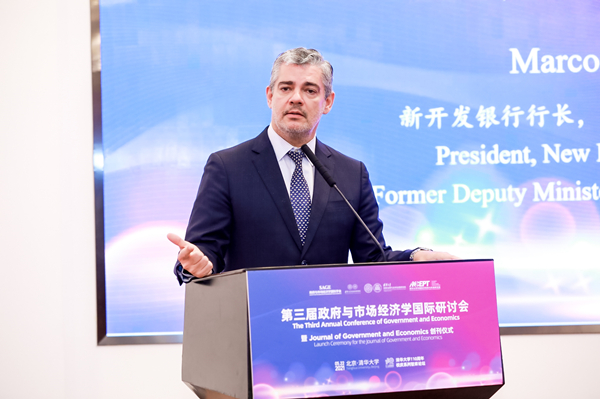
In his speech, Marcos Troyjo suggested that successful interactions between the government and economy are a key component of a nation’s ability to develop, rise, and prosper. Nations rise when they successfully react to the changing contours of globalization, and because the conditions of globalization are constantly changing, the relationship between government and economy must also adjust. The past few years have seen a trend of de-globalization along with a resurgence of protectionism and economic nationalism, and Mr. Troyjo argues that the new phase of globalization have emerged.
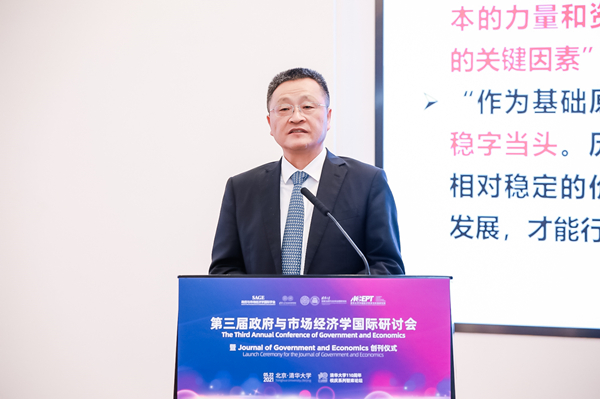
Ge Honglin pointed out that the government should effectively serve as the economy’s patron saint, looking out for its healthy development. He said that a city's vitality is more important than its strength, and that the government must continuously inject new vitality through economic development, using quality of life as a measure of this vitality. Economic development is a systematic project, and creating a healthy ecosystem is a necessary condition for success.
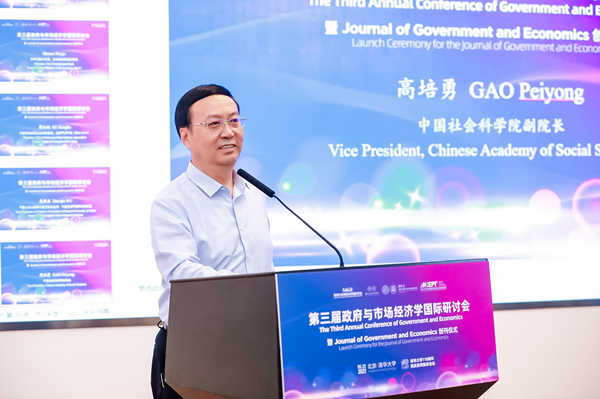
Gao Peiyong said that the pandemic has spurred significant changes in China’s government-market relationship, particularly from the perspective of macroeconomic policy configuration, which is increasingly centered on market players. He said that when the main strategic direction is to achieve a high level of self-reliance, success is dependent on innovation and reform, and the main subjects of this innovation and reform must be market players. Indeed, the vast majority of reform and innovation occurs in relation to market players, not only at the practical level, but also at the theoretical level, where the relationship between government and market players is becoming increasingly clear. On the topic of monetary policy, Gao Peiyong believes that it is now striving for flexibility, precision, reasonableness, and moderation, as well as maintaining a reasonable abundance of liquidity and promoting financial support for the development of the real economy. The focus is also on the real economy and market players, which is different from expanding demand in general.
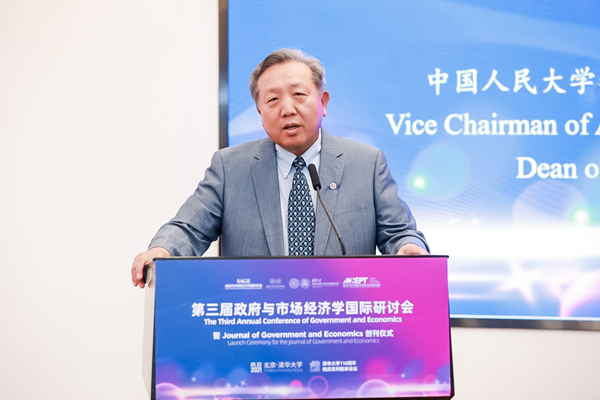
According to Wu Xiaoqiu, over the past 40 years, China has both abandoned the planned economy model of the former Soviet Union and decided not to follow the market economy model represented by the U.S. Instead, it has taken a third path—a path that first absorbed the rational, scientific, and civilized components of a market economy. Thus, China has a market economy, but not one that borders on fundamentalism. On this path, the boundary between government and market is continually optimized. Wu Xiaoqiu pointed out that the practice of China's reform and opening up over the past 40 years is enriching social and economic theory for all of mankind, which may be more applicable to countries with similar national conditions to China.